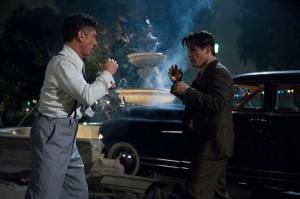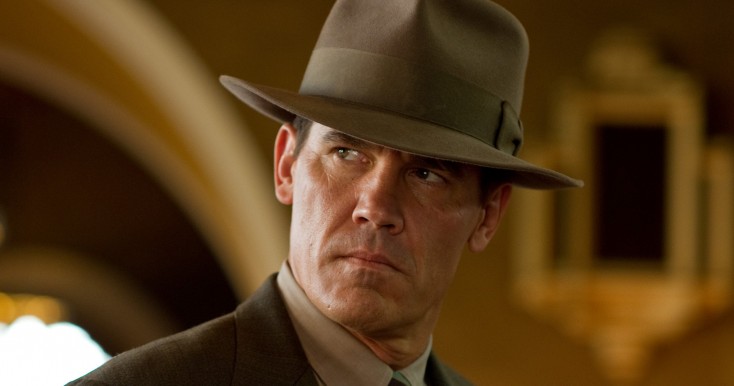
(L-r) SEAN PENN as Mickey Cohen and JOSH BROLIN as Sgt. John O’Mara in Warner Bros. Pictures’ and Village Roadshow Pictures’ drama “GANGSTER SQUAD.” ©Warner Bros. Entertainment. CR: Wilson Webb.
By ANGELA DAWSON
Front Row Features
HOLLYWOOD—It takes a brave soul to take on a Method actor like Sean Penn, but Josh Brolin was up for whatever the Oscar winner was ready to throw at him. Or, at least he thought he was.
While shooting a scene for their new period drama “Gangster Squad,” Brolin narrowly escaped Penn’s right hook, according to the actor.
“The fight with Sean was the most difficult because he didn’t rehearse as much as I did,” the handsome Brolin recalls. “His fists were flying wildly during the fight. I think he was hoping we were getting something useable (to print).”
While he won’t say whether his co-star actually landed a punch or not, Brolin confesses they both were pretty winded by the time they finished the scene, pointing out both he and Penn are both ex-smokers.
“That was the most challenging on the oxygen level,” he quips.
Brolin, 44, plays the leader of a Los Angeles police squad in the late 1940s. He and his handpicked officers are assigned a covert mission to rid the City of Angels of mobsters—in particular notorious crime boss Mickey Cohen (played by Penn). Based on the Paul Lieberman novel about real events, Brolin plays Sgt. John O’Mara, a former soldier and soon-to-be father who is tasked with bringing down Cohen, who has established a firm foothold in organized crime in LA after arriving from Brooklyn. Owing to rampant corruption and fear in the police department, O’Mara and his men work without badges or backup so they are free to take on Cohen’s organization by any means necessary.
The high-firepower drama is directed by Ruben Fleischer (“Zombieland”) and adapted for the screen by Will Beall. Alongside Brolin and Penn, the film boasts an all-star cast including Ryan Gosling, Emma Stone, Nick Nolte, Anthony Mackie and Michael Pena.
Brolin recently spoke about going mano-a-mano with Penn and playing a good guy with a license to kill in “Gangster Squad.”
Q: Did any of Sean’s punches connect?
Brolin: (smiling) Possibly.
Q: How did you prepare for the role?
Brolin: We got to talk to some people and we got to talk to (the real) John O’Mara’s daughter. You kind of create a composite character and see how it works. Then you get to the set and Ryan’s doing something this way and Sean’s doing something that way. So you’ve got to adjust and hopefully find the best dynamic that you can create on the set. But it was the same thing with (2007’s cops-and-robbers drama) “American Gangster.” There was a very specific character that I was going after, more like (noted New York police detective) Bob Leucci. Then you find out about somebody else who just feels more dynamic and right for the time. (O’Mara) was less a laconic character when we filmed it. In editing, we found it much better to have me shut up and go for more of that (strong but silent) Bogey-Clint Eastwood type thing. It seemed to balance things out better.
Q: Objectively, how did you view your character?
Brolin: I think he has a lot of integrity. I like the fact that it’s this kind of old idea of somebody who has the honor of not following the manual of what they say law is back then. The law was a lot less paranoid than it is now. The boundaries of law were a lot more malleable then than they are now. Guys thought outside the box. So the good guy was not necessarily the good guy. He had to think dirty in order to snuff out these guys who were trying to turn Los Angeles into the Wild Wes or a cesspool. After he got back from World War II, (O’Mara) was shocked at how much Los Angeles had changed. Instead of being narcissistic and selfish, he thought about the future of his kids.
Q: Did you talk to your father (actor James Brolin), who grew up in LA during this movie’s time period?
Brolin: Actually, my dad came to visit us (on set). We were doing the scene at O’Mara’s house one day. I asked my pop a bunch of questions like, “What was it like back then?” You see I’m seventh generation Californian. We were looking out on the street that had been recreated because of the cars mostly. But all of the houses were pretty much already of that time. He just kind of went off on these stories about when he was nine years old, how he used to peek in the back door of Slapsy Maxie’s (nightclub) and go down the street to Ciro’s looking for Mickey Cohen and his goons and all that kind of stuff. He was talking about corruption and gangster stories or the idea of gangsters as celebrities back then. And yet, there was an innocence in everything he was saying. I think that was the difference: the innocence of who (O’Mara) is, and the idea that you can manifest something honorable and make an impact.
Q: Could you talk a little bit about the costumes? What was the best and worst part of them?
Brolin: They were itchy and tight. (He chuckles.)
Q: You have an incredible supporting cast. How’d you get them?
Brolin: We came out with an amazing cast that wouldn’t necessarily need to do smaller parts. A lot of these guys are lead guys now. I just kind of got to stand back and watch them (act). When you have Anthony Mackie, Michael Pena and Robert Patrick on set together, it’s absolute f****** chaos. It’s a lot of fun to be able to watch. They created a kind of vortex that became what you see on film. Within all this testosterone, it’s because of them that you get to take a breath. The impact of all the other stuff is much more apparent because of them.
Q: Are there any funny outtakes?
Brolin: I’ll show you the gag reel if you want to come over. (He chuckles.) It’s funny because those things are so serious and you’re making decisions. Ryan does this great thing where he shoots behind him. It’s all kind of so super cool and all of that. It’s kind of fun, but at the same time it’s very serious. We’ve had a lot of things come up lately that make it very serious. For a guy (like me) who doesn’t have any guns myself—I live in a very Republican area in Central Coast of California where I’m surrounded by gun-toting guys—I get a little nervous (shooting weapons on film). That’s why I like the fight with Sean—because I like tactile things. I miss a good fight.
Q: Is there a special sensitivity about what you just said now about the recent mass shootings in Aurora, Colo., and Newtown, Conn.?
Brolin: Of course there’s a sensitivity. But you have to look at the grand scheme of things from a universal standpoint. You have (violent) videogames. You have psychopharmaceuticals. You have low employment. You have parents that aren’t at home. There are many different factors (that breed violence). You have CNN that gloms on to the worst of what’s going on and not necessarily the best or the most heroic. There’s no one reason (violent killings take place). There’s always been violence in movies and there always will be violence in movies. Whether it lends to the one psychotic that’s out there that’s thinking the worst thoughts you can possibly think is always going to be a mystery.
Q: What do you learn from a guy like Sean Penn?
Brolin: We’ve known each other for a long time. I don’t find him very intense, myself. But he’s an amazing actor. We work similarly and we have a lot of fun on the set. We don’t go around with furrowed brows and stuff like that. Working with him is actually a great pleasure.
Q: Any stories you can share about him?
Brolin: Sean and I went to a test screening and we snuck in the back. I don’t remember where it was. Maybe Glendale (a suburb outside of LA). We snuck in the back. I think Sean even wore a hoodie, which I thought was funny. We got through and not only were there a lot of laughs and all that, but we got through the film and it was wild the reaction. I mean clapping, standing up, hooting, hollering. To see that kind of reaction is kind of great as an escapist movie. You follow the testosterone or whatever you see it as and just kind of go along for the ride and take it for what it is. It was quite a treat.
Q: What are you doing next?
Brolin: I just finished “Old Boy” (a remake of a 2003 South Korean thriller).
Q: Is it going to be quite violent?
Brolin: It’s going to be great. It should not be but I think it’s going to be. I think we got in there and something came together. (Director Spike Lee) was fantastic. (Actress) Lizzie Olson is incredible. I’m just so blown away by her. And the fight sequence is amazing. The general structure but it’s more of a reinterpretation than it is a remake. I called (director) Chan-wook Park myself and I told him that I needed his blessing in order to do this because I wouldn’t do it without his blessing. He said absolutely, just don’t do the same movie, and I assured him we’re not.





